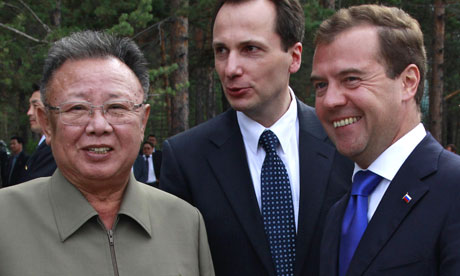
Kim Jong Il’s Excellent Adventure In Siberia
Publication: Eurasia Daily Monitor Volume: 8 Issue: 166
By:

During his meetings with President Dmitry Medvedev on August 24, Kim-Jong Il reportedly agreed to resume the six-party talks over North Korea’s nuclear weapons without preconditions; if the talks take place, he would then impose a moratorium on nuclear testing and production of (unspecified) nuclear materials. Kim also agreed to set up a commission to explore the possibility of building a gas pipeline from Siberia through the DPRK to South Korea. North Korea would obtain approximately $100 million in fees from this pipeline which would open in 2017 and apparently ship 10 billion cubic meters (bcm) of gas annually to South Korea for 30 years. (Nezavisimaya Gazeta, Moskovskiy Komsomolets, August 22). Predictably the Russian press made a great deal of this meeting, but closer examination of the agreements and both sides’ motives should induce at best limited modified rapture, if not something less, among observers.
North Korea’s and Kim’s motives (actually the two are synonymous) are palpable. Earlier this year, China refused to give him military assistance. Furthermore it clearly set conditions for new economic assistance – namely, returning to the six-party talks without preconditions (Argumenty Nedeli, Argumenty i Fakty, NHK, August 24). Given North Korea’s desperate economic situation, not only did the DPRK actually send an emissary to Washington for preliminary discussions, Kim had no choice but to accept the conditions. China’s economic leverage on North Korea may be unwelcome, but it is the logical outcome of North Korea’s continuing refusal to open its economy to the rest of the world. Since this economic leverage on Pyongyang has been growing to an uncomfortable point, Kim has decided to invoke a long-standing North Korean diplomatic tradition. Namely, he is again resorting to the tactic of playing off Russia and China as rivals for influence over or in North Korea to secure the best deal. Therefore, these talks were not only about the pipeline, but also about opening up rail connections from Siberia to South Korea through the North (Moskovskiy Komsomolets Online, August 22).
Russia also used these talks to discuss options for the North to repay its debts to the Soviet Union, for which Russia is now the inheritor. Beyond the economic talks, Moscow agreed to discuss a resumption of military cooperation that will apparently assume the form of naval maneuvers (Kyodo World Service, August 22). Finally, it is clear that Kim in fact agreed to nothing tangible. As a South Korean observer noted, if he was serious about this moratorium he would have addressed this statement to Washington, not Moscow. Second, resuming the talks without preconditions flies in the face of South Korea, Japan, and US insisting on tangible progress toward denuclearization as a condition for reopening the talks. Finally, agreeing to establish a commission to investigate setting up the pipeline commits nobody to anything except exploratory discussions that can easily be slowed or terminated whenever it suits any of the parties.
Moscow’s motives are also discernible. Medvedev has added a major new impetus to Russia’s desire to be seen as a key player in Northeast Asia, mainly through energy, and as a corollary of this standing, through its position in the six-party talks that had been less than prominent. Therefore, many Russian writers talked of possible breakthroughs stemming from this meeting and its agreements (The Voice of Russia, August 25; Moskovskiy Novosti Online, August 22). Likewise, these talks help foster a much less threatening atmosphere than was the case in 2010, when Moscow literally feared that the Korean peninsula was on the brink of war. Stability in Korea is a sine qua non of Russia’s East Siberian development strategy upon which its entire “Ostpolitik” stands. So, to the degree it can seemingly upgrade its standing and facilitate that stability, Moscow will seize any such opportunity.
Third, as noted above, Russia is able to resume rivalry with China, albeit under the guise of a strategic partnership with China for influence in and over North Korea, and gain leverage over Beijing by actually building a gas pipeline to Asia. Chinese-Russian talks on a gas pipeline to China are deadlocked, while the idea of such a trans-Korean pipeline is almost a decade old (the idea of the railroad dates back further to Sergei Witte). These manifestations of an energy silk road or iron silk road, as they are called, are integral to Russian policy in Asia, but have been blocked due to the conflict over Korea. By receiving assent to a Korean pipeline, Moscow not only advances toward achieving multiple long-held goals, it also raises pressure on China (or at least thinks it does) with the fact that Moscow now has alternatives in Asia. And at the same time, it gains more access to North Korea – apparently, a Russian intelligence officer will mentor Kim Jong Un, Kim Jong Il’s son and successor, on world affairs.
Yet none of this is certain. One Russian article actually likened this agreement to the ill-starred Molotov-Ribbentrop treaty of 1939 (Novaya Gazeta, August 23). Russian officials admit that no pipeline is possible without strong guarantees from North or South Korea, neither of which has been forthcoming even though the South agreed in principle to a gas pipeline from Russia in 2008. Neither Washington nor Seoul seem to think much of this deal, while Kim once again wants something (aid) for nothing, and promises to consider something in the future. Likewise talk about a gas pipeline is cheap but negotiating the detail is like making a long-term marriage contract. So far none of the key issues have even been agreed to (Moskovskiy Novosti, August 24). The projected Russo-Chinese gas pipeline has been under discussion for 15 years and it is no nearer to an agreement on price, volume, financing or other key issues today than before. It may turn out that there truly is something here, but until then wariness should be the operative word going forward.




